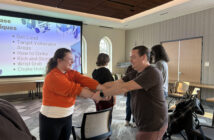A gentle scratching noise drifted through my open window.

Kelly McCoy (Emily Hu/B&W Photo)
Curious, I paused folding my laundry and peered outside. In the gravel lot below me, a small boy scraped a plastic shovel through the rocks and dirt below him, scooping them up. A cardboard box into which he dumped his shovel full of earth sat a few feet away from him. He then returned to his original excavation site to repeat the process. As an observer to the situation, the act seemed pointless.
“Kids will be entertained by anything,” I chuckled to myself, turning away from the window. As I resumed folding my laundry, I thought about my evaluation. Sure, the act may have looked pointless to an outsider, but perhaps it carried a significant meaning to this child. Maybe this boy imagined he was building an empire — was there an entire castle in that lot that only he could see? Potentially. A child’s imagination is incredibly complex, after all.
Where does this imagination go when we get older, though? When do we decide that traditionally childish acts or thoughts are unacceptable? Why does growing up have to be synonymous with shrinking our whimsy, our imagination?
At some point, the weight of the accumulated responsibilities of adulthood start holding us back. We schedule times to go to the gym, to hang out with friends, to do piles of homework — but rarely take time out of the day to daydream. To just simply sit and let our minds wander — and not only when nodding off in calculus. Exercising one’s imagination can be a powerful tool for mental wellness, mood and memory. It can also make us feel more connected to the people in our lives.
You cannot go through life with your head entirely in the clouds, especially if you want to achieve tangible goals. It never hurts to envision the outcome of these goals, though. Motivation is strengthened if you can picture and imagine the outcome of a task. Your daydreams could be entirely outlandish as well. You could imagine yourself as a character in your favorite book series — or perhaps your daydreams are science-fiction adventures. It’s your brain.
Kids are not only masters of imagination, but also masters of apathy. This is not the existentialist apathy so many college students become acquainted with during their time at university — rather, it is the type of apathy surrounding other’s perceptions of them. The small boy shoveling gravel doesn’t seem to mind that others might be confused by his actions. If you were to do the same thing in your own driveway, how worried would you be about how people look at you? How often do you worry about how people perceive you on a daily basis? Is this holding you back from doing what you really want? How would the presentation of your personality change if you just did whatever made you happy?
This apathy toward perception also brings a disregard for perfection, particularly in younger children. As a bona fide perfectionist, I often avoid starting assignments for fear of messing up. I tend to focus too intently on details, often losing the big picture of an assignment or goal.
I wasn’t always like this though. There was a time that I cared less, where I colored outside the lines instead of within them. Where I threw myself into new projects and friendships without worrying obsessively about the outcome. Finals throws this perfectionism into sharp relief as well — striving towards a perfect 4.0, the end-all-be-all of academic achievements. While academic success is nothing to cough at, what is sacrificed in its pursuit? Do you still have time to daydream between studying and assignments?
In the midst of my own reverie, the small boy had disappeared, returning inside his house — no doubt in search of another adventure, following another whimsy.
Although I envy his simpler responsibilities, I am comforted knowing that our childlike qualities never truly disappear, laying dormant until we choose to acknowledge them once again. So this week, try acknowledging a whimsical or imaginative daydream. Acknowledge your own desires for happiness and seek them out — regardless of how you look to other people. Acknowledge that academics have importance, but so do friends and family and good food and sleep.
Acknowledge your inner child.
—
Kelly McCoy, ’17, is the design editor for The Brown and White. She can be reached at kam217@lehigh.edu.





Comment policy
Comments posted to The Brown and White website are reviewed by a moderator before being approved. Incendiary speech or harassing language, including comments targeted at individuals, may be deemed unacceptable and not published. Spam and other soliciting will also be declined.
The Brown and White also reserves the right to not publish entirely anonymous comments.